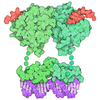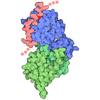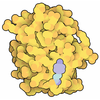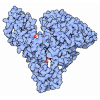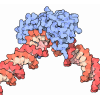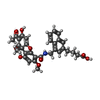Entry Database : PDB / ID : 3v9yTitle Crystal structure of the PPARgamma-LBD complexed with a cercosporamide derivative modulator Peptide from Nuclear receptor coactivator 1 Peroxisome proliferator-activated receptor gamma Keywords / / / Function / homology Function Domain/homology Component
/ / / / / / / / / / / / / / / / / / / / / / / / / / / / / / / / / / / / / / / / / / / / / / / / / / / / / / / / / / / / / / / / / / / / / / / / / / / / / / / / / / / / / / / / / / / / / / / / / / / / / / / / / / / / / / / / / / / / / / / / / / / / / / / / / / / / / / / / / / / / / / / / / / / / / / / / / / / / / / / / / / Biological species Homo sapiens (human)Method / / Resolution : 2.1 Å Authors Matsui, Y. / Hanzawa, H. Journal : Bioorg.Med.Chem.Lett. / Year : 2012Title : Substituents at the naphthalene C3 position of (-)-Cercosporamide derivatives significantly affect the maximal efficacy as PPAR(gamma) partial agonistsAuthors : Furukawa, A. / Arita, T. / Fukuzaki, T. / Satoh, S. / Mori, M. / Honda, T. / Matsui, Y. / Wakabayashi, K. / Hayashi, S. / Araki, K. / Ohsumi, J. History Deposition Dec 28, 2011 Deposition site / Processing site Revision 1.0 Feb 1, 2012 Provider / Type Revision 1.1 Nov 8, 2023 Group Data collection / Database references ... Data collection / Database references / Derived calculations / Refinement description Category chem_comp_atom / chem_comp_bond ... chem_comp_atom / chem_comp_bond / database_2 / pdbx_initial_refinement_model / struct_ref_seq_dif / struct_site Item _database_2.pdbx_DOI / _database_2.pdbx_database_accession ... _database_2.pdbx_DOI / _database_2.pdbx_database_accession / _struct_ref_seq_dif.details / _struct_site.pdbx_auth_asym_id / _struct_site.pdbx_auth_comp_id / _struct_site.pdbx_auth_seq_id
Show all Show less
 Yorodumi
Yorodumi Open data
Open data Basic information
Basic information Components
Components Keywords
Keywords Function and homology information
Function and homology information Homo sapiens (human)
Homo sapiens (human) X-RAY DIFFRACTION /
X-RAY DIFFRACTION /  MOLECULAR REPLACEMENT / Resolution: 2.1 Å
MOLECULAR REPLACEMENT / Resolution: 2.1 Å  Authors
Authors Citation
Citation Journal: Bioorg.Med.Chem.Lett. / Year: 2012
Journal: Bioorg.Med.Chem.Lett. / Year: 2012 Structure visualization
Structure visualization Molmil
Molmil Jmol/JSmol
Jmol/JSmol Downloads & links
Downloads & links Download
Download 3v9y.cif.gz
3v9y.cif.gz PDBx/mmCIF format
PDBx/mmCIF format pdb3v9y.ent.gz
pdb3v9y.ent.gz PDB format
PDB format 3v9y.json.gz
3v9y.json.gz PDBx/mmJSON format
PDBx/mmJSON format Other downloads
Other downloads https://data.pdbj.org/pub/pdb/validation_reports/v9/3v9y
https://data.pdbj.org/pub/pdb/validation_reports/v9/3v9y ftp://data.pdbj.org/pub/pdb/validation_reports/v9/3v9y
ftp://data.pdbj.org/pub/pdb/validation_reports/v9/3v9y


 Links
Links Assembly
Assembly
 Components
Components Homo sapiens (human) / Gene: PPARG, NR1C3 / Production host:
Homo sapiens (human) / Gene: PPARG, NR1C3 / Production host: 
 Homo sapiens (human) / References: UniProt: Q15788
Homo sapiens (human) / References: UniProt: Q15788 X-RAY DIFFRACTION / Number of used crystals: 1
X-RAY DIFFRACTION / Number of used crystals: 1  Sample preparation
Sample preparation ROTATING ANODE / Type: RIGAKU FR-E DW / Wavelength: 1.5418 Å
ROTATING ANODE / Type: RIGAKU FR-E DW / Wavelength: 1.5418 Å Processing
Processing MOLECULAR REPLACEMENT
MOLECULAR REPLACEMENT Movie
Movie Controller
Controller









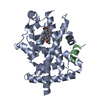

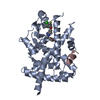
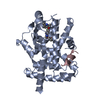
 PDBj
PDBj